2023–24 Annual Report
Safe Canadians, Secure Economy
On this page
FINTRAC’s mandate
FINTRAC is one of 13 federal departments and agencies that play a key role in Canada’s Anti-Money Laundering and Anti-Terrorist Financing Regime, which is led by the Department of Finance Canada. As Canada’s Financial Intelligence Unit and Anti-Money Laundering and Anti-Terrorist Financing Supervisor, the Centre helps to combat money laundering, terrorist activity financing and threats to the security of Canada.
The Centre produces actionable financial intelligence in support of investigations of Canada’s law enforcement, national security agencies and other domestic and foreign agencies in relation to these threats. FINTRAC also generates valuable strategic financial intelligence, including specialized research reports and trends analysis, for regime partners and policy decision-makers, businesses and international counterparts. This strategic financial intelligence shines a light on the nature, scope and threat posed by money laundering and terrorist financing.
The Centre is able to fulfill its financial intelligence mandate by working with Canadian businesses to ensure compliance with the Proceeds of Crime (Money Laundering) and Terrorist Financing Act and associated Regulations. Compliance with the Act helps to prevent, detect and deter criminals from using Canada's economy to launder the proceeds of their crimes or to finance terrorist activities. It also ensures the Centre receives the information that it needs to produce financial intelligence for Canada’s law enforcement and national security agencies.
FINTRAC’s financial intelligence is in high demand internationally, as is its supervisory knowledge and expertise. The Centre is regularly asked to lead international conferences and workshops and to contribute to global research projects, training and bilateral and multilateral capacity building initiatives.
In fulfilling its core financial intelligence and compliance mandates, FINTRAC is committed to safeguarding the information that it receives and discloses to Canada’s law enforcement and national security agencies. The Centre understands that the protection of privacy is critical to maintaining Canadians’ confidence in FINTRAC and Canada’s broader Anti-Money Laundering and Anti-Terrorist Financing Regime.
What is money laundering?
Money laundering is the process used to disguise the source of money or assets derived from criminal activity. There are three recognized stages in the money laundering process:
- Placement involves placing the proceeds of crime in the financial system.
- Layering involves converting the proceeds of crime into another form and creating complex layers of financial transactions to disguise the trail and the source and ownership of funds. This stage may involve transactions such as the buying and selling of stocks, commodities or property.
- Integration involves placing the laundered proceeds back into the economy to create the perception of legitimacy.
The money laundering process is continuous, with new ‘dirty’ money constantly being introduced into the financial system.
What is terrorist activity financing?
Terrorist activity financing is the use of funds, property or other services to encourage, plan, assist or engage in acts of terrorism, where the primary motivation is not financial gain.
Two main differences distinguish terrorist activity financing from money laundering:
- Funds can be from legitimate sources, not just criminal acts; and
- Money is the means, not the end—the goal is to use funds to facilitate or implement terrorist activities.
Message from the Director and CEO

I am proud to report on the work that FINTRAC carried out, and the impactful results that we achieved, in 2023–24 as Canada's Financial Intelligence Unit and Anti-Money Laundering and Anti-Terrorist Financing Supervisor.
FINTRAC continues to operate in a challenging environment with new and evolving technologies and financial products, rapidly shifting global financial systems, and geopolitical events constantly shaping our work. Our role in detecting, preventing and deterring money laundering and the financing of terrorist activities is more critical than ever as criminals and terrorists are using increasingly sophisticated methods to exploit vulnerabilities and take advantage of any opportunity to enrich themselves and advance their illicit enterprises.
As captured in Canada's Updated Assessment of Inherent Risks of Money Laundering and Terrorist Financing in 2023, we face a number of significant money laundering threats, including in relation to drug trafficking, fraud, illegal gambling, corruption and third-party money laundering. Transnational organized crime groups and professional money launderers are the most prominent money laundering threat actors in the Canadian context. At the same time, while the threat of terrorist financing is not as pronounced in Canada as it is in other regions of the world, there are networks operating in our country that are suspected of raising, collecting and transmitting funds abroad to various terrorist groups.
Over the past year, we played a critical role in helping to confront these threats and protect the safety of Canadians, particularly Canada's most vulnerable citizens and communities. With the information that we receive from Canadian businesses, we produced more than 4,600 financial intelligence disclosure packages, based on 1,783 unique disclosures, in support of investigations of money laundering, terrorist financing and threats to the security of Canada. Our ability to provide multiple disclosure packages means that we can assist Canada's law enforcement and national security agencies in connecting criminal activities and operations across a number of jurisdictions by following the money.
In September 2023, the RCMP, working in cooperation with U.S. Homeland Security in Buffalo, New York, recognized FINTRAC's contribution to Operation Heinze, a 16-month investigation that resulted in the arrest of an individual in possession of 433 kilograms of cocaine that was destined for Canada. Believed to be the largest cocaine seizure in the history of western New York, this operation led to multiple charges for, among other things, participating in a criminal organization and money laundering. It's not hard to imagine the harm that these drugs would have done in our communities and to our most vulnerable citizens.
We also worked collaboratively with our federal, provincial, municipal, private sector and international partners last year to advance Canada's innovative public-private partnerships, which target major money laundering threats both domestically and internationally. In partnership with Canada's largest banks, Canadian law enforcement agencies and foreign financial intelligence units, we generated more than 450 disclosures of actionable financial intelligence in support of money laundering investigations related to human trafficking, online child sexual exploitation, the trafficking of fentanyl, illicit cannabis activities, romance fraud, illegal wildlife trade, and casino-related underground banking.
In total last year, our financial intelligence contributed to 266 significant, resource intensive investigations, and many hundreds of other individual investigations at the municipal, provincial and federal levels across the country, and internationally. I was pleased to see that 92% of the feedback that we received from Canada's law enforcement and national security agencies indicated that our financial intelligence provided new information on known subjects and 72% signaled that it included valuable information on unknown subjects related to their investigations.
Over the past year, we also helped safeguard Canada's financial system and economy by ensuring that businesses comply with the Proceeds of Crime (Money Laundering) and Terrorist Financing Act and associated Regulations. With our shift to an enhanced risk-based approach to supervision, we have focused on modernizing and evolving our supervisory framework beyond measuring 'technical compliance' to promoting risk awareness, risk identification and effective risk mitigation, closely aligned with the money laundering and terrorist financing vulnerabilities identified in Canada's inherent risk assessment for more than 30 economic sectors and financial products.
With this change, we are tailoring our approaches to better meet the needs of businesses in the form of services, support and tools that make it easier for them to identify and mitigate money laundering and terrorist financing risks, and meet legislative requirements. For example, our shift to risk-based supervision means providing businesses with ease of access to FINTRAC in order to upload and share reporting information. For us, it also means the ability to assess a business's data quality and timeliness and provide immediate feedback if there are anomalies in the rate or quality of reporting.
We are committed to working with businesses to assist them in understanding and complying with their obligations, including providing comprehensive guidance, answering thousands of enquiries, hosting dedicated fora and meetings with vulnerable sectors and introducing new communications tools and platforms. At the same time, we have made it clear that we will be firm in ensuring that businesses do their part to help protect Canada and Canadians, and we have taken firm action when it was needed. Over the past year, we issued the largest administrative monetary penalties in the history of the Centre. In total, we issued 12 Notices of Violation in the amount of more than $26 million. We also disclosed our largest number of cases of non-compliance to law enforcement for potential criminal investigation.
Combatting money laundering and terrorist financing is a moral and social imperative. Whether it's drug trafficking, fraud, human trafficking, or online child sexual exploitation, these crimes threaten our communities and our most vulnerable citizens. They are not victimless crimes. In the case of human trafficking for sexual exploitation, the majority of victims are women under the age of 25, including many minors.
Last year, FINTRAC's assistance was recognized by Ontario's Human Trafficking Intelligence-led Joint Forces Strategy, which includes the Ontario Provincial Police, Toronto Police Service, Greater Sudbury Police Service and Treaty Three Police Service. As a result of their 65 investigations since 2021, more than 230 charges were laid against 28 people. The victims ranged from 12 to 47 years old.
Just as we are working with businesses to assist and ensure their compliance with the Act, so too are we collaborating with them and our federal partners to implement our new modernization vision, which is focused on combatting money laundering and terrorist financing in real-time. This means harnessing modern skills, tools and technologies to be able to identify, assess and communicate risk in real-time; to support and respond to businesses in real-time; to receive reporting in real-time; to conduct our analysis in real-time; and to generate financial intelligence for law enforcement and national security agencies in real-time or as close to it as we can get.
As we look at our work in combatting human trafficking for sexual exploitation, for example, being able to work in real-time will be a game-changer, particularly as it relates to reporting by businesses and our intelligence analysis. It will allow us to proactively identify and assist law enforcement in disrupting networks much quicker. This will mean rescuing victims sooner, saving them from prolonged abuse. It will mean supporting survivors sooner, getting them the assistance they need in a more timely fashion. And it will help law enforcement target, arrest and charge the traffickers sooner, preventing the abuse of new victims.
With our innovative Digital Strategy, we're advancing Centre-wide digital automation, analytics and the use of artificial intelligence. We have created a new digital acceleration and modernization team that will allow us to experiment with, and exploit, the latest technologies. With our focus on modernization, we are leaping ahead from a technical, process and culture perspective so that we can stay ahead of the bad actors, find new and meaningful ways to collaborate with our partners and continue to deliver value and results for Canadians in an ever-changing world.
I want to recognize and thank our talented and dedicated employees for their hard work and the impressive results that are captured throughout this report. I am proud to work with such capable professionals who are recognized here in Canada and internationally for their knowledge, expertise and commitment to the global fight against money laundering and the financing of terrorist activities.
Sarah Paquet
Director and Chief Executive Officer
Protecting the safety of Canadians
As part of its core mandate, FINTRAC provides actionable financial intelligence to Canada's law enforcement and national security agencies to help them combat money laundering, terrorist financing and threats to the security of Canada. The Centre's intelligence plays a key role in helping to protect the safety of Canadians, particularly Canada's most vulnerable citizens and communities.
In 2023–24, FINTRAC produced more than 4,600 financial intelligence disclosure packages, based on 1,783 unique disclosures, in support of investigations of money laundering, terrorist financing and threats to the security of Canada. The Centre's financial intelligence was critical to the success of increasingly large, sophisticated and cross-jurisdictional law enforcement investigations over the past year.
Given the complexity of connecting the flow of illicit funds involving organized criminal groups, FINTRAC's financial intelligence often contains hundreds or even thousands of financial transaction reports in each disclosure. Over the past year, the Centre's unique disclosures contained 297,733 financial transaction reports, which included more than 966,705 financial transactions.
| Disclosure type | Unique disclosures | Disclosure subjects | Transactions in disclosures | Reports in disclosures | Total value disclosed |
|---|---|---|---|---|---|
Voluntary information record instigated |
1,249 |
4,908 |
806,512 |
227,471 |
$26,417,085,672 |
Financial intelligence unit (FIU) query instigated |
97 |
427 |
56,577 |
48,771 |
$14,917,355,780 |
Proactive |
346 |
939 |
103,616 |
21,491 |
$2,306,926,711 |
Disclosure of foreign FIU info |
91 |
298 |
– |
– |
– |
Total |
1,783 |
6,572 |
966,705 |
297,733 |
$43,641,368,163 |
Average per disclosure |
– |
3.7 |
542 |
167 |
$24,476,370.25 |
A FINTRAC financial intelligence disclosure may show links between individuals and businesses that have not been identified in an investigation, and may help investigators refine the scope of their cases or shift their sights to different targets. A disclosure can pertain to an individual or a wider criminal network, and can also be used by law enforcement to put together affidavits to obtain search warrants and production orders. FINTRAC's unique disclosures contained a total of 6,572 subjects.
Approximately 20% of the Centre's financial intelligence disclosures last year were provided proactively to Canada's law enforcement and national security agencies, which means the individuals or networks identified in the financial intelligence may not have been known to these agencies before FINTRAC's intelligence was received.
In June 2023, the RCMP's Federal Serious and Organized Crime Unit in New Brunswick recognized FINTRAC's contribution to an investigation into the trafficking of illegal drugs in that province and Ontario. In the course of the investigation, police seized approximately 18 kilograms of cocaine, 3.5 kilograms of crystal methamphetamine and $454,000 in cash. Charges against four individuals included possession of cocaine for the purpose of trafficking, possession of proceeds of crime, and the commission of an offence for the benefit of, at the direction of, or in association with a criminal organization.
FINTRAC's financial intelligence is also used to reinforce applications for the listing of terrorist entities, negotiate agreements at the time of sentencing and advance the government's knowledge of the financial dimensions of threats, including organized crime and terrorism.
In 2023–24, FINTRAC's financial intelligence was used in a wide variety of money laundering investigations where the origins of the suspected criminal proceeds were linked to drug trafficking, fraud, human trafficking and human smuggling, tax evasion, and other criminal offences. The Centre's financial intelligence disclosures are aligned to the threats captured in Canada's Updated Assessment of Inherent Risks of Money Laundering and Terrorist Financing.
Top five predicate offences related to case disclosures: 2023–24
- Drugs
 23%
23% - Fraud
 20%
20% - Tax evasion
 10%
10% - Customs/Excise
 7%
7% - Crimes against persons (139 focused on human trafficking)
 7 %
7 %
Disclosure packages by recipient: 2023–24
| Royal Canadian Mounted Police | 1,883 |
|---|---|
Municipal Police |
789 |
Provincial Police |
689 |
Canada Border Services Agency |
556 |
Canada Revenue Agency/Revenu Québec |
231 |
Foreign Financial Intelligence Units |
231 |
Canadian Security Intelligence Service |
181 |
Provincial Securities Regulators |
38 |
Department of National Defence |
6 |
Competition Bureau |
5 |
Communications Security Establishment |
3 |
Global Affairs Canada |
1 |
Office of the Superintendent of Financial Institutions |
1 |
Throughout 2023–24, the Centre's financial intelligence contributed to 266 major, resource intensive investigations as well as many hundreds of other individual investigations at the municipal, provincial and federal levels across the country. Canadian law enforcement agencies—particularly the Royal Canadian Mounted Police—continue to be the main recipients of FINTRAC's financial intelligence.
FINTRAC’s financial intelligence disclosures are often provided to a number of agencies simultaneously when there is authorization to do so. The ability to provide multiple disclosure packages means that the Centre can help law enforcement and national security agencies connect criminal activities and operations across a number of domestic and international jurisdictions by following the money.
In June 2023, the RCMP and Canada Border Services Agency (CBSA) acknowledged FINTRAC’s contribution to an investigation that led to the dismantling of a human trafficking ring that was operating across Southwestern Ontario. The suspects were allegedly advertising internationally for labourers to work at local businesses. Once in Canada, the victims’ travel documents were taken from them, they were paid substandard wages and their living conditions bordered on inhumane. Following the execution of search warrants at multiple businesses and residences, 31 victims were identified and rescued. Two individuals were charged with a series of offences including human trafficking, sexual assault, proceeds of crime and employing a foreign national.
Disclosure packages by province/territory: 2023–24
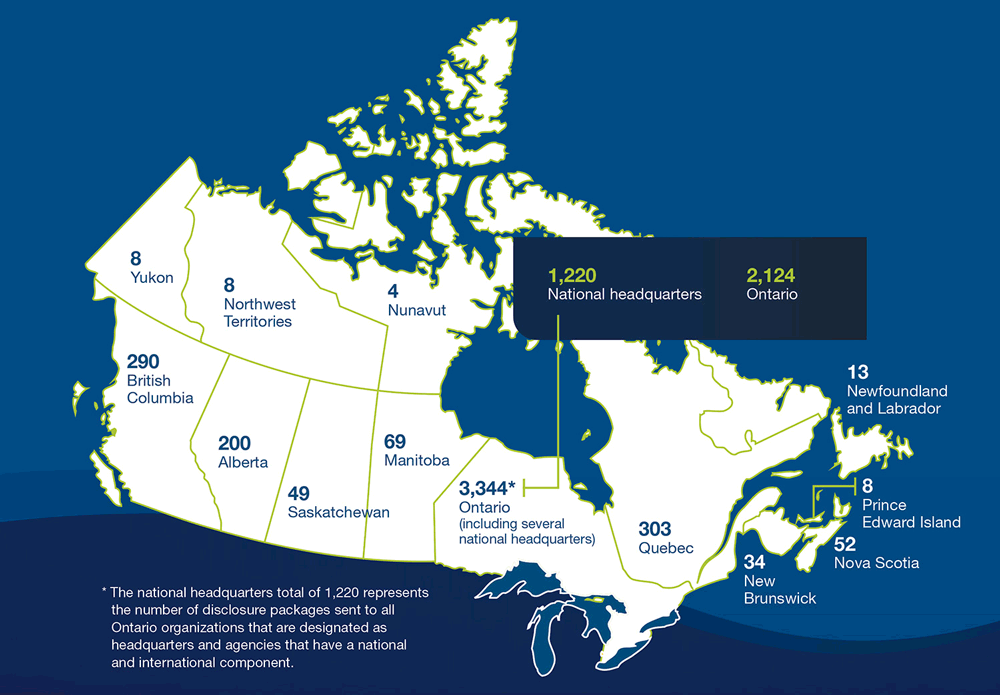
View text equivalent Disclosure packages by province/territory: 2023–24
|
Ontario (including several national headquarters) National headquarters – 1,220 Ontario – 2,124 |
3,344Footnote * |
|---|---|
| Quebec | 303 |
| British Columbia | 290 |
| Alberta | 200 |
| Manitoba | 69 |
| Nova Scotia | 52 |
| Saskatchewan | 49 |
| New Brunswick | 34 |
| Newfoundland and Labrador | 13 |
| Yukon | 8 |
| Northwest Territories | 8 |
| Prince Edward Island | 8 |
| Nunavut | 4 |
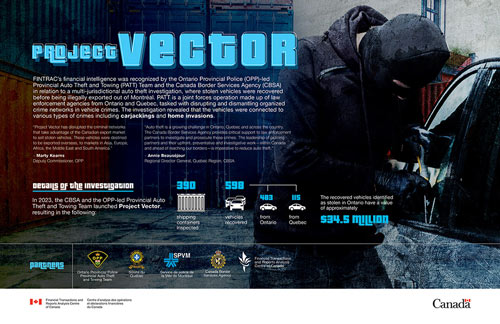
View text equivalent for the Project Vector poster
This poster depicts the contribution that FINTRAC's financial intelligence made in Project Vector.
FINTRAC’s financial intelligence was recognized by the Ontario Provincial Police (OPP)-led Provincial Auto Theft and Towing (PATT) Team and the Canada Border Services Agency (CBSA) in relation to a multi-jurisdictional auto theft investigation, where stolen vehicles were recovered before being illegally exported out of Montréal. PATT is a joint forces operation made up of law enforcement agencies from Ontario and Quebec, tasked with disrupting and dismantling organized crime networks in vehicle crimes. The investigation revealed that the vehicles were connected to various types of crimes including carjackings and home invasions.
Details of the investigation: In 2023, the CBSA and the OPP-led Provincial Auto Theft and Towing Team launched Project Vector, resulting in the following:
- 390 shipping containers inspected
- 598 vehicles recovered (483 from Ontario / 115 from Quebec)
The recovered vehicles identified as stolen in Ontario have a value of approximately $34.5 million.
Partners: Ontario Provincial Police Provincial Auto Theft and Towing Team, Canada Border Services Agency, Sûreté du Québec, Service de police de la Ville de Montréal, Financial Transactions and Reports Analysis Centre of Canada
Quote from Marty Kearns, Deputy Commissioner, OPP: "Project Vector has disrupted the criminal networks that take advantage of the Canadian export market to sell stolen vehicles. These vehicles were destined to be exported overseas, to markets in Asia, Europe, Africa, the Middle East and South America."
Quote from Annie Beauséjour, Regional Director General, Quebec Region, CBSA: “Auto theft is a growing challenge in Ontario, Quebec and across the country. The Canada Border Services Agency provides critical support to law enforcement partners to investigate and prosecute these crimes. The leadership of policing partners and their upfront, preventative and investigative work – within Canada and ahead of reaching our borders – is imperative to reduce auto theft.”
FINTRAC’s financial intelligence was recognized by the OPP-led Provincial Auto Theft and Towing (PATT) Team and the CBSA in relation to Project Vector, a multi-jurisdictional auto theft investigation, where stolen vehicles were recovered before being illegally exported out of Montréal. The investigation revealed that the vehicles were connected to various types of crimes including carjackings and home invasions. In 2023, 390 shipping containers were inspected and 598 vehicles were recovered (483 from Ontario and 115 from Quebec). The recovered vehicles identified as stolen in Ontario have a value of approximately $34.5 million.
While FINTRAC is an arm's length Financial Intelligence Unit, the Centre maintains productive working relationships with Canada's law enforcement and national security agencies, among others, to ensure that its financial intelligence is relevant, timely and valuable. Throughout 2023–24, FINTRAC participated in dozens of operational meetings with municipal, provincial and federal law enforcement agencies, security commissions and other federal and provincial organizations across the country. Of note, FINTRAC also contributed to Project Vector, which was an investigation led by the Ontario Provincial Police’s Provincial Auto Theft and Towing Team.
Over the past year, the Centre also provided nearly 60 presentations to its Anti-Money Laundering and Anti-Terrorist Financing Regime partners, stakeholders and Canadian law enforcement and national security agencies on the value of financial intelligence in relation to the investigation of money laundering, terrorist financing, threats to the security of Canada and other types of financial crime. These presentations were organized by, among others, the Canadian Police College (Internet Child Exploitation Course), the RCMP (Proceeds of Crime, Child Exploitation and Cryptocurrency Investigator Courses), the Ontario Police College (Fraud and Human Trafficking Investigator Courses), and the Toronto Police Service (Human Trafficking Conference).
In 2023–24, FINTRAC also engaged and helped advance the objectives of the Counter Illicit Finance Alliance of British Columbia (CIFA-BC). This included participating in regular meetings among all relevant CIFA-BC stakeholders, as well as the involvement of FINTRAC in smaller working groups created to generate reports and discuss specific issues pertaining to topics such as cryptocurrency, wildlife trafficking, illegal online gaming and improving information flows to support civil asset recovery. In these working groups and regular meetings, FINTRAC regularly engaged with many private sector entities, including financial institutions, credit unions and casinos, as well as with public sector stakeholders at all levels of government.
FINTRAC always seeks feedback on its financial intelligence from disclosure recipients at the municipal, provincial and federal levels. Over the past year, the Centre received 159 disclosure feedback forms, 92% of which indicated that FINTRAC's financial intelligence provided new information on known subjects and 72% signaled that it included valuable information on unknown subjects related to their investigations. This is a clear and significant measure of the effectiveness of FINTRAC.
Throughout the year, FINTRAC received 2,485 voluntary information records related to money laundering and terrorist activity financing from Canada's law enforcement and national security agencies, as well as from members of the public. Voluntary information records provide critical information on alleged criminals and terrorists and are often the starting point for the Centre's analysis. These records are used by FINTRAC to establish connections between individuals and entities and to develop actionable financial intelligence for disclosure recipients.
The significant volume of voluntary information records received year-after-year, particularly from law enforcement at all levels, is an important indication of the value that is placed on FINTRAC's financial intelligence.
Results through public-private partnerships
It takes a strong, equipped and committed network to defeat modern, international criminal and terrorist networks. The best example of the extensive collaboration that takes place within Canada's Anti-Money Laundering and Anti-Terrorist Financing Regime is its successful public-private partnerships.
Aligned with the threats identified in Canada's Updated Assessment of Inherent Risks of Money Laundering and Terrorist Financing, these partnerships are aimed at more effectively combatting the laundering of proceeds stemming from human trafficking, online child sexual exploitation, romance fraud, the trafficking of illicit fentanyl, illicit cannabis activities, illegal wildlife trade and money laundering in British Columbia and across Canada.
By working with Canadian businesses and law enforcement agencies throughout Canada, FINTRAC has been effective in following the money to identify potential subjects, uncovering broader financial connections and providing intelligence to advance national project-level investigations. In total, over the past year, FINTRAC provided more than 450 disclosures of actionable financial intelligence to Canada’s law enforcement agencies in relation to the seven public-private partnerships.

In July 2023, the Alberta Law Enforcement Response Teams acknowledged FINTRAC’s contribution to an investigation that led to the arrest of an individual from Calgary on multiple charges, including trafficking in a person, material benefit from trafficking and assault causing bodily harm. ALERT announced that it believed the accused was aggressively attempting to recruit other women, including on social media.

Canada’s ongoing public-private partnerships
Project Protect:
Combatting human trafficking for sexual exploitation and labour trafficking
Project Guardian:
Countering the trafficking of fentanyl
Project Chameleon:
Tackling romance fraud and emergency grandparent scams

Project Shadow:
Targeting online child sexual exploitation
Project Athena:
Combatting money laundering in British Columbia and across Canada
Project Anton:
Combatting illegal wildlife trade
Project Legion:
Combatting the laundering of proceeds from illegal cannabis activities
In January 2024, the Sûreté du Québec acknowledged FINTRAC's contribution to an investigation that led to the dismantling of a network of producers and traffickers who were illegally selling cannabis online. More than 70,000 transactions, totalling $15 million, were allegedly carried out by traffickers linked to organized crime. Ten people were charged with money laundering and the production, possession, trafficking and sale of cannabis.
Safeguarding Canada’s financial system
As part of its core mandate, FINTRAC administers a comprehensive, risk-based compliance program to assist and ensure that businesses fulfill their obligations under the Proceeds of Crime (Money Laundering) and Terrorist Financing Act and associated Regulations.
These obligations allow for certain economic activities to be more transparent, which helps deter criminals and terrorists from using Canada's financial system to launder the proceeds of their crimes or finance terrorist activities.
Compliance with the legislation also ensures that FINTRAC receives the information that it needs to generate actionable financial intelligence for Canada's law enforcement and national security agencies. Financial transaction reporting statistics from 2023–24 can be found in Annex B.
As part of its new vision for modernization in 2023–24, FINTRAC shifted more fully to an enhanced risk-based approach to supervision, updating and evolving its supervisory framework beyond measuring 'technical compliance' to promoting risk awareness, risk identification and effective risk mitigation. This shift was closely aligned with the money laundering and terrorist financing vulnerabilities identified in Canada's inherent risk assessment for more than 30 economic sectors and financial products.
With this shift, FINTRAC is tailoring its approaches to better meet the needs of businesses in the form of services, support and tools that make it easier for them to identify and mitigate money laundering and terrorist financing risks, and meet legislative and regulatory requirements. For example, this shift to risk-based supervision means providing businesses with ease of access to FINTRAC in order to upload and share reporting information. For the Centre, it also means the ability to assess a business's data quality and timeliness and provide immediate feedback if there are anomalies in the rate or quality of reporting.
The evolution within FINTRAC's Supervision sector has included a move from regional management to enterprise management, where end-to-end operations are now delivered through sector-specific streams. With this more targeted, client-centric approach to supervision, new teams have been established with a dedicated focus on a particular business sector. Employees on those teams are committed to acquiring in-depth knowledge of the business processes and risks in that sector, which is resulting in more meaningful and targeted assistance as well as the ability to target the most significant risks, thereby strengthening the overall effectiveness of Canada's Anti-Money Laundering and Anti-Terrorist Financing Regime.
Businesses covered under the Act
- Accountants
- Agents of the Crown
- British Columbia notaries
- Casinos
- Dealers in precious metals and precious stones
- Financial entities
- Life insurance
- Money services businesses
- Real estate
- Securities dealers
In support of its shift to an enhanced risk-based approach to supervision, FINTRAC has been actively exploring how technology can help identify businesses for assessment based on their exposure to money laundering and terrorist financing risks; automate the assessment process and reduce the burden for businesses; analyze money laundering and terrorist financing risk information, including assessment results; and communicate new risks to businesses faster. Staying ahead of bad actors hinges on using digital technologies to make it easier for businesses to understand their risks and submit their financial transaction reports to FINTRAC.
FINTRAC's modernization is focused on positioning the Centre to work in real-time. From a supervisory perspective, this means conducting its analysis of emerging money laundering and terrorist financing risks and communicating them to businesses faster; assessing anti-money laundering and anti-terrorist financing controls of businesses faster; receiving financial transaction reports from businesses faster; and generating financial intelligence for Canada's law enforcement and national security agencies in as close to real-time as possible. Conducting faster, targeted assessments of more businesses vulnerable to money laundering and terrorist financing risks, and taking swifter action when deficiencies are found, will help FINTRAC detect, deter and, ultimately, prevent financial crimes that threaten Canadians, Canadian communities and Canada's financial system.
Throughout 2023–24, FINTRAC's Supervision sector continued to implement its three operational pillars: assistance, assessment and enforcement.

In July 2023, the London Police Service acknowledged FINTRAC’s contribution to Project Safe, an operation focused on combatting gun violence across London, Ontario. Following the execution of 26 search warrants, police seized 26 guns and over $8.5 million in drugs, including fentanyl, crack cocaine, cocaine, methamphetamine and OxyContin. A total of 70 people were charged with a combined 550 criminal offences in relation to the investigations.
Assistance to businesses
FINTRAC is committed to working with businesses to assist them in understanding and complying with their obligations under the Proceeds of Crime (Money Laundering) and Terrorist Financing Act and associated Regulations.
Timely, targeted and thorough guidance
- Promoted awareness and action based on the Updated Assessment of Inherent Risks of Money Laundering and Terrorist Financing
- Shared extensive information on FINTRAC's implementation of a new assessment of expenses funding model (i.e., cost recovery), which will see a shift of funding for FINTRAC's supervisory activities from taxpayers to businesses subject to the Act and associated Regulations
- Provided guidance, including scenarios and field descriptions, to support businesses in implementing the new reporting method and forms for large cash transaction reports and large virtual currency transaction reports
- Created technical resource documents to help businesses prepare for changes to the electronic funds transfer report and casino disbursement report
- Published guidance to support armoured car services in meeting their new requirements when they come into force on July 1, 2024
- Updated guidance on the 24-hour rule to reorganize information in plain language, add scenarios and provide detailed information on how to aggregate transactions
- Published guidance to support mortgage administrators, brokers and lenders in meeting their new requirements when they come into force in October 2024
Outreach and engagement
- Hosted a Casino Forum in British Columbia, bringing together casino executives, federal partners and industry experts to discuss risk and emerging issues in the casino sector
- Collaborated with industry stakeholders in the development of modern new reporting forms
- Held a virtual workshop for life insurance companies aimed at increasing suspicious transaction reporting from the sector and improving the quality of reporting
- Supported the Canadian Real Estate Association in the creation of new versions of risk assessment tools for its members
- Participated in the Edmonton Real Estate Association and British Columbia Real Estate Association annual conferences highlighting the importance of suspicious transaction reporting to FINTRAC's financial intelligence efforts
- Presented to the Canadian Jewellers Association on the importance of suspicious transaction reporting and the indicators of money laundering and terrorist financing that are present within that sector
- Conducted a number of virtual webinar presentations for mortgage professionals, through various national or provincial associations, to assist them in meeting their new obligations when they come into force in October 2024
Responses to enquiries
- Responded to 10,934 enquiries from businesses in every reporting sector
- Key issues included reporting obligations, access to reporting systems, the registration of money services businesses, and the requirements associated with the regulatory amendments that came into force in June 2021
Memoranda of understanding
- Signed Confidentiality Undertaking (information-sharing agreements) and exchanged information with the United States' FinCEN and the Office of the Comptroller of the Currency on key compliance examination findings and considerations for enforcement action on an entity
- Signed an MOU with the Office of the Superintendent of Financial Institutions to establish a framework for sharing information to assist FINTRAC in administering its assessment of expenses funding model
- Finalized MOUs with the Real Estate Council of Ontario and the Saskatchewan Liquor and Gaming Authority

In August 2023, the Hamilton Police Service recognized FINTRAC’s contribution to Project Odeon, which resulted in the dismantling of a significant producer of fentanyl and other synthetic drugs in the Greater Hamilton and Toronto Area. Following a lengthy investigation, 48 criminal charges were laid against 12 people, including possession for the purpose of trafficking, production of substance, proceeds of crime and firearm possession. Police also seized an operational fentanyl drug lab, more than 64 kilograms of drugs, including 25.6 kilograms of fentanyl, 18 kilograms of methamphetamine and 6 kilograms of ketamine, as well as $350,000 in cars, jewelry and cash.
In November 2023, the RCMP’s Integrated Proceeds of Crime Unit in Montréal acknowledged FINTRAC’s contribution to an investigation that led to charges under the Proceeds of Crime (Money Laundering) and Terrorist Financing Act against two individuals for failing to register with FINTRAC as a money services business and thus operating an unregistered money services business. The two individuals made illegal monetary transactions totalling more than $20 million using a scheme to collect and move funds clandestinely from Canada to Algeria, mainly through China.
Money services business registry
Businesses that exchange foreign currencies, transfer money, cash/sell money orders or traveller’s cheques, or deal in virtual currency must register with FINTRAC before offering these services to the public. Moreover, they must renew their registration every two years. A registration with FINTRAC does not indicate an endorsement or licensing of the business. It only means that the business has fulfilled its legal requirement under the Act to register with FINTRAC.
Individuals convicted of certain offences under, among other statutes, the Proceeds of Crime (Money Laundering) and Terrorist Financing Act, the Controlled Drugs and Substances Act or the Criminal Code are ineligible to register a money services business in Canada. Should such a determination be made, the registration is either denied or revoked. Money services businesses are also required to respond to demands for information from FINTRAC or their registrations are revoked. In total, there were 17 revocations in 2023–24 and two denials of registration. In order to enhance transparency and assist other business sectors with their risk assessments, FINTRAC publishes, on a quarterly basis, the names of money services businesses whose registration has been revoked.
Over the past year, the Centre reached out to 96 new money services businesses to validate registrations and with clarification requests in order to assess whether the businesses had supplied all required information.
In total, 1,390 money services businesses registered or were renewed with FINTRAC in 2023–24. In addition, 135 businesses ceased their registrations and 250 registrations expired. As of March 31, 2024, 2,984 money services businesses were registered with the Centre.
Assessment
With FINTRAC's shift to enhanced, risk-based supervision, the Centre heightened the scope of its oversight and supervisory activities, introducing meaningful and timely new ways of assessing the compliance of businesses. Consistent with Financial Action Task Force (FATF) guidance, these new interventions are expanding FINTRAC's reach and effectiveness, allowing the Centre to screen businesses based on their risk profiles, vulnerability to money laundering and terrorist financing risks and potential non-compliance; assess businesses more quickly; and provide earlier corrective actions aligned with the severity of the deficiencies.
In 2023–24, FINTRAC assessed the compliance of more than 600 businesses through one or more types of assessment activity.
Data quality of financial transaction reports
FINTRAC monitors the quality, timeliness and volume of the financial transaction reporting that it receives from businesses across the country. The Centre has invested heavily in validating and monitoring reporting data, including improving its business processes to increase the effectiveness of its monitoring. In 2023–24, FINTRAC received a total of 48,800,406 financial transaction reports from businesses. It accepted 462,862 financial transaction reports for which it subsequently issued a warning to businesses about the quality of those reports.
In addition to monitoring the data that is received on an ongoing basis, FINTRAC also reviews and analyzes its data holdings searching for variances, anomalies and trends in the financial transaction reporting of businesses across the county. In addition, the Centre created and issues Data Integrity Report Cards to businesses that highlight missing or inadequate information in the reports they submit to FINTRAC. These score cards have produced timely and positive results, with the majority of businesses having either made the necessary corrections or begun the changes before meeting with a FINTRAC official.

In September 2023, the Sûreté du Québec recognized FINTRAC’s contribution to the investigation of a large-scale drug trafficking network allegedly linked to the Hells Angels. Following numerous site and vehicle searches, police seized 17 kilograms of cocaine, 12 kilograms of crystal meth, 132,000 methamphetamine pills, 2 kilograms of methamphetamine, nearly 20 firearms and more than $760,000 in cash.
Supervisory activities
Self-assessments by businesses assist FINTRAC in addressing money laundering and terrorist financing risks and facilitating the compliance of businesses with their obligations more quickly and effectively than is the case with lengthier examinations.
FINTRAC regularly reminds businesses of its Voluntary Self-declaration of Non-compliance, a mechanism for informing the Centre when businesses face instances of non-compliance. Promoting open dialogue and transparency without the threat of a penalty allows the Centre to work with businesses to quickly and effectively address non-compliance that they have identified. This mechanism also helps to ensure that FINTRAC receives reporting that it otherwise might not have, information that is critical to the production of actionable financial intelligence for Canada's law enforcement and national security agencies.
In 2023–24, FINTRAC received over 280 Voluntary Self-declarations of Non-compliance. Financial entities submitted the majority of these declarations in relation to reports that had not been provided. The Centre collaborated with these entities to ensure that the transactions were submitted accurately to FINTRAC, and provided guidance when it was required.
Over the past year, FINTRAC conducted Supervisory Risk and Assessment Questionnaires, which are completed by businesses and are designed to assess their risk exposure and compliance with their anti-money laundering and anti-terrorist financing obligations. Approximately 100 businesses completed the questionnaire in 2023–24.
FINTRAC undertakes more formal, lengthier examinations to assess the compliance of businesses that generally report large numbers of transactions or are at a higher risk of being deficient or exploited by money launderers or terrorist financiers. Consistent with its transition from an audit to an assessment approach over the past few years, FINTRAC has undertaken more complex, lengthy and in-depth examinations of larger businesses in higher risk sectors in order to determine how effectively they are fulfilling their compliance obligations.
The Centre's examinations can take the shape of a full-scope examination of the entire compliance program of a business; a modular blitz examination, which focuses on several businesses in the same sector and is centred on a targeted risk and/or vulnerability; or targeted examinations, which are limited to a specific risk or vulnerability or a specific anti-money laundering and anti-terrorist financing control. FINTRAC also conducts follow-up activities, when appropriate, to determine if a business has addressed previous instances of non-compliance. Over the past year, FINTRAC undertook 123 formal examinations, with the greatest focus on money services businesses, securities dealers, financial entities and real estate.
FINTRAC has also established a process for monitoring financial entities’ compliance with their action plan commitments following an examination. The process constitutes ongoing feedback to entities on the actions they take to strengthen their compliance program and address exam findings. An action item is considered closed once the financial entity can demonstrate that it has taken all appropriate corrective measures. The Centre’s ongoing engagement with financial entities following an examination reinforces positive compliance behaviours and promotes higher rates of compliance during follow-up activities.
FINTRAC also undertakes the direct assessment of the compliance of businesses through monitoring meetings. These meetings, between the Centre and the compliance team of a business, are used to assess the money laundering and terrorist financing risk profile of a business as well as the state of its anti-money laundering and anti-terrorist financing program and controls. Monitoring meetings are a quick and effective way to address non-compliance and can lead to action plans and milestones for addressing recognized gaps and deficiencies. FINTRAC holds quarterly monitoring meetings with all six of Canada’s largest banks and a major credit union given their very high vulnerability to money laundering and terrorist financing risks. Over the past year, the Centre also held monitoring meetings with 50 of Canada’s small and medium-sized banks and 10 real estate brokerages across the country.

In October 2023, the RCMP Manitoba Organized Crime Unit recognized FINTRAC’s contribution to Project Doom, an investigation into suspicious activity in Winnipeg casinos. Through the investigation, it was determined that an individual from Winnipeg was supplying illicit drugs to remote First Nation communities. The cash proceeds of these illicit drug sales were then used at casinos to hide the connection to criminal activity. An individual was charged with trafficking fentanyl and cocaine, money laundering, and possession of proceeds of crime. Police also seized 498 grams of crack cocaine, 882 counterfeit OxyContin tablets (fentanyl), 241 Percocet tablets, and 26 gabapentin tablets.
Enforcement
FINTRAC is committed to working with businesses to assist them in understanding and complying with their obligations. However, the Centre is also prepared to take firm action when it is required to ensure that businesses take their responsibilities seriously. This includes imposing administrative monetary penalties when warranted and providing Non-Compliance Disclosures to law enforcement.
In numerous public engagements and meetings with the senior leaders of Canadian businesses over the past year, FINTRAC's Director and Chief Executive Officer stressed that combatting money laundering and terrorist financing can never be viewed as a cost centre or an expense – that it is a moral and social imperative to act.
Crimes committed in Canada and across the globe are committed primarily for profit. These crimes – whether it's drug trafficking, fraud, human trafficking or online child sexual exploitation – threaten Canada's communities and Canada's most vulnerable citizens. They are not victimless crimes. For example, in the case of human trafficking for sexual exploitation, the traffickers target Canada's most vulnerable citizens, with the majority of victims being women under the age of 25, including minors.
Beyond the risk to Canadians, money laundering undermines the integrity of Canada's financial system and harms Canada's legitimate economy, which Canadian businesses rely upon: it distorts market prices, creates unfair competition and damages the reputation of our financial sector. More broadly, money laundering fosters corruption and leads to the erosion of public institutions and the rule of law, lower government revenues and a loss of credibility and influence internationally.
Terrorists and those supporting terrorism also look to exploit Canada's financial system to facilitate their devastating activities. Whether it is individuals engaged in ideologically motivated violent extremism in Canada, extremist travellers or international terrorist groups, FINTRAC has seen how they move their money to facilitate their terrorist activities.
It is imperative that businesses fulfill their legal obligations. Compliance deters criminals and terrorists from operating in the legitimate economy. It also ensures that FINTRAC receives the information needed to generate actionable financial intelligence to help target, disrupt and dismantle the organized criminal and terrorist networks that threaten Canadians.
In her public engagements and private interactions, FINTRAC's Director also made it clear that some Canadians businesses were not where they should be from a compliance perspective, and that the Centre was committed to ramping up its enforcement action in order to protect Canada and Canadians.
Administrative monetary penalties
In 2008, FINTRAC received the legislative authority to issue administrative monetary penalties to businesses that are in non-compliance with the Proceeds of Crime (Money Laundering) and Terrorist Financing Act. Under the legislation, penalties are intended to be non-punitive and are focused on changing the non-compliant behaviour of businesses. The administrative monetary penalties program supports FINTRAC's mandate by providing a measured and proportionate response to particular instances of non-compliance.
In 2019, the Centre published its updated Administrative Monetary Penalties policy, which outlines clearly and transparently the penalty process and FINTRAC's method of calculating penalties for non-compliance with the Act and associated Regulations. The Centre also developed and published a number of specific guides that describe its approach to assessing the harm done by the 200 violations prescribed in the Proceeds of Crime (Money Laundering) and Terrorist Financing Administrative Monetary Penalties Regulations, as well as FINTRAC's rationale in determining the corresponding penalty amounts.
FINTRAC is required to publicly name all persons and entities that receive an administrative monetary penalty. In the past year, the Centre committed to being more open and transparent, and publishing additional information, about the nature of violations committed by businesses subject to the Proceeds of Crime (Money Laundering) and Terrorist Financing Act.
In 2023–24, FINTRAC issued the largest administrative monetary penalties in the history of the Centre. In total, the Centre issued 12 Notices of Violation in the amount of more than $26 million. The public notice of a penalty may occur months after the issuance of a Notice of Violation. Therefore, the fiscal year that an administrative monetary penalty is made public may not align with the fiscal year that the Notice of Violation is issued.
FINTRAC has imposed approximately 140 penalties across most business sectors since it received the legislative authority to do so in 2008.
Non-compliance disclosures to law enforcement agencies
Under the Proceeds of Crime (Money Laundering) and Terrorist Financing Act, FINTRAC may disclose cases of non-compliance to law enforcement for potential criminal investigation when it is extensive or if there is little expectation of immediate or future compliance. In 2023–24, the Centre disclosed 14 such cases.
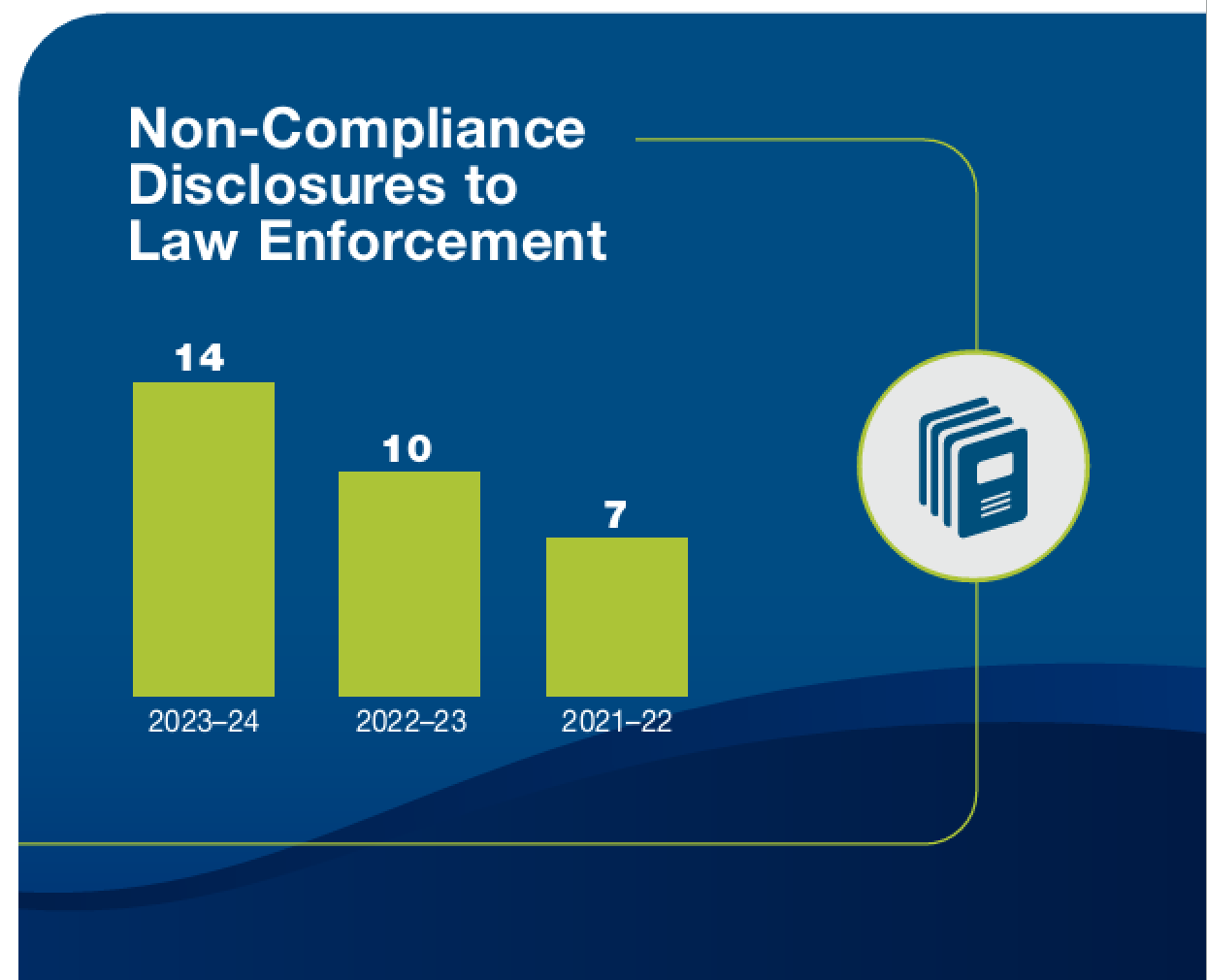
Global leadership
FINTRAC works with its allies and partners in a global effort to combat international money laundering and terrorist financing. As a Centre that is recognized for its expertise and global contribution, FINTRAC is regularly asked to lead conferences and workshops and contribute to international research projects, training and bilateral and multilateral capacity building initiatives.
Recognizing the transnational nature of money laundering and terrorist financing, FINTRAC cooperates with foreign financial intelligence units to protect Canadians and the integrity of Canada's financial system. Through over 100 bilateral agreements, the Centre is able to disclose financial intelligence to financial intelligence units worldwide when appropriate thresholds are met. At the same time, foreign intelligence units are able to share their information with FINTRAC, which broadens its analyses of international financial transactions. In 2023–24, the Centre received 280 queries for information from foreign financial intelligence units in relation to money laundering and terrorist financing, and provided 97 unique disclosures and 231 disclosure packages. FINTRAC's unique disclosures to foreign financial intelligence units contained 48,771 transaction reports, which included a total of 56,577 financial transactions. The disclosures identified 427 subjects.
For its part, FINTRAC sent 76 requests to foreign financial intelligence units seeking further financial intelligence to broaden its own analysis.
In recent years, FINTRAC has developed a survey to assess the level of satisfaction among international partners with the Centre's financial intelligence. In 2023–24, this survey focused on the 20 foreign financial intelligence units that, in total, receive more than 90% of FINTRAC's disclosures. The survey's results showed an overall satisfaction rate of 85% in relation to FINTRAC's financial intelligence. Over 89% of respondents stated that the Centre's disclosures identified previously unknown information, and 89% of respondents said that FINTRAC's disclosures expanded on existing information.
Following the Russian Federation's illegal invasion of Ukraine in 2022, FINTRAC worked with Canada's Five Eyes partners and Western European allies to establish the Russia-Related Sanctions and Illicit Finance Financial Intelligence Units Working Group. Over the past year, members continued to work within their respective authorities to surge the sharing of tactical financial intelligence and develop a common base of understanding through the dissemination of strategic-level intelligence on a variety of related issues.

In November 2023, the Alberta Securities Commission acknowledged FINTRAC’s assistance when it found that an individual and entities that he controlled perpetrated a fraud and misappropriated over $3.4 million from investors in relation to the development and sale of commercial real estate in Edmonton, Alberta.
This collaboration was critical to the development of FINTRAC's updated Special Bulletin on Russia-linked money laundering activities, which was published in May 2023. This Special Bulletin provides background and updated information relevant to Russia-linked money laundering. It highlights, for example, the use of intermediary jurisdictions to set up networks of shell and front companies, in addition to non-resident bank accounts as key methods for Russia-linked money laundering. It also notes that Russia-linked actors subject to sanctions by Canada or its allies may also attempt to hide the ultimate beneficial ownership of assets by transferring legal ownership to family members, close associates and other nominees. The Special Bulletin is meant to be used by businesses to identify and assess money laundering and terrorist financing risks, apply controls and measures to mitigate these risks, and detect and report suspicious transactions to FINTRAC.
In early 2024, FINTRAC also collaborated with the financial intelligence unit of the Netherlands, in consultation with the Financial Crimes Enforcement Network (FinCEN) in the United States, to develop a Joint FIU Advisory on the illegal procurement of dual-use goods by Russian end-users. Following Russia's illegal invasion of Ukraine, the financial intelligence units of the Netherlands and Canada received reports from a variety of sources describing the suspected illegal export, or attempted export, of dual-use goods to Russian end-users in violation of current sanctions or export control-related legislation. This advisory was created to support businesses in recognizing and reporting financial transactions and other related activity that is suspected of being associated with the laundering of the proceeds linked to the purchase and/or sale of dual-use goods for illegal export from Canada.
In 2023–24, FINTRAC worked closely with FinCEN and Mexico's Unidad de Inteligencia Financiera to establish the North American Drug Dialogue's Illicit Finance Working Group as part of a collaborative effort to advance each country's counter-narcotics strategies by constructing a more unified approach to detecting, deterring and preventing the illicit trade and financing of fentanyl and other synthetic opioids globally. In line with this objective, Project Guardian evolved to focus on addressing gaps related to the transnational nature of opioid trafficking and the resulting misuse and exploitation of financial institutions. As part of these efforts, FINTRAC organized and hosted a Project Guardian Virtual Roundtable, an event designed to facilitate the sharing of information related to criminal trends, typologies and financial indicators, as well as to strengthen domestic and international collaboration in confronting the financing associated with fentanyl and synthetic opioid production and distribution. The roundtable featured speakers from the public and private sectors, and brought together nearly 400 attendees representing the financial sector, law enforcement and intelligence agencies from the United States, Mexico, Canada and beyond.
FINTRAC is an active member of the Egmont Group, which is comprised of more than 170 financial intelligence units worldwide. As part of its contribution to the group, the Centre has led or participated in numerous projects, including the development of typologies, the delivery of technical assistance and the provision of training.
FINTRAC's Director and CEO continued in her fourth year as the Chair of the Egmont Information Exchange Working Group in 2023–24. The mandate of this group is focused on improving cooperation and information sharing among financial intelligence units by identifying new trends and methods related to money laundering and terrorist financing; sharing best practices and expertise among financial intelligence units; and seeking new and innovative ways to develop and share financial intelligence.

On December 5, the RCMP in Manitoba recognized FINTRAC’s assistance following the arrest of an individual allegedly involved in high-level drug trafficking rings and money laundering. RCMP Federal, Serious and Organized Crime investigators found that the individual was laundering his profits by converting cash to cryptocurrency. Following a search of 10 properties, police seized more than $6 million in drugs, equipment, and proceeds of crime. More than $3 million in property, $2 million in illicit cannabis, $700,000 in drug and cryptocurrency equipment, and seven firearms were also seized during the searches.
As part of its work on the Egmont Information Exchange Working Group over the past year, FINTRAC contributed to a number of new and ongoing projects, including in relation to trade-based money laundering and abuse of corporate structures; abuse of virtual assets and non-profit organizations for terrorist financing purposes; extreme right wing terrorism; and the role of financial intelligence units in countering sanctions evasion.
FINTRAC's Director and CEO also serves as a member of the Egmont Committee, which acts as a steering/advisory group for the Chair of Egmont. In this role, she is part of the Information Management Sub-committee where she successfully supported the launch of the new Egmont Secure Web in October 2023. The Director is also a member of the Egmont Centre of FIU Excellence and Leadership (ECOFEL) Reference Group, which supports ECOFEL related priorities.
FINTRAC's Director and CEO created the Women's Head of FIU series as a forum for members to exchange insights related to challenges of being women leaders, particularly within an international context, and also celebrate their successes. This series provides an accessible and supportive system for women leading financial intelligence units to collaborate and encourage productive and relevant dialogue. Since its inception in summer 2022, there have been four virtual events and four in-person events aligned with Egmont Meetings.
FINTRAC is also a member of Canada's delegation to the Financial Action Task Force (FATF), an international body that sets standards and promotes the effective implementation of legal, regulatory and operational measures for combatting money laundering and terrorist financing. In 2023–24, the Centre contributed to the review of several mutual evaluations and follow-ups, supported the improvement of FATF standards and processes and assisted with the preparation of the fifth round of mutual evaluations. FINTRAC also collaborated on numerous policy and research documents, including on issues such as illicit financial flows from cyber-enabled fraud and crowdfunding for terrorist financing, and many others, to strengthen the international efforts to combat money laundering and terrorist financing through a strong international regime. In addition, the Centre made significant contributions of strategic financial intelligence to the FATF Risks, Trends and Methods Working Group's Crowdfunding and Terrorist Financing Risks project.
FINTRAC also continued to support Canada's international efforts to improve anti-money laundering and anti-terrorist financing regimes around the world through its active and ongoing contributions to the work of FATF-Style Regional bodies, including the Caribbean Financial Action Task Force (CFATF) and the Asia/Pacific Group (APG).


In December 2023, the Alberta Securities Commission and Alberta RCMP Integrated Market Enforcement Team acknowledged FINTRAC’s contribution to an investigation of a fraudulent investment scheme that led to a court sentence against a Calgary individual on one count of fraud over $5,000 and one count of laundering the proceeds of crime. The individual was sentenced to 4.5 years of imprisonment and ordered to pay restitution in the amount of $229,138 to seven investors.
FINTRAC’s international engagement at a glance
Technical training
Global FAST Initiative
Global Coalition to Fight Financial Crime
International Financial Action Strike Team (IFAST)
UN Office on Drugs and Crime
Major case investigator training
International Supervisory Forum
Joint Chiefs of Global Tax Enforcement
Enhancing awareness of money laundering and terrorist financing
FINTRAC produces valuable strategic intelligence in the fight against money laundering and terrorist financing. Through the use of research and analytical techniques, the Centre is able to identify emerging characteristics, trends and tactics used by criminals to launder money or fund terrorist activities. The goal of FINTRAC's strategic intelligence is to inform Canada's security and intelligence community, regime partners and policy decision-makers, businesses, Canadians, and international counterparts about the nature and extent of money laundering and terrorist financing in Canada and throughout the world. Following legislative changes in 2023, FINTRAC is also now able to produce strategic financial intelligence relevant to threats to the security of Canada.
Closely aligned with Canada's Updated Assessment of Inherent Risks of Money Laundering and Terrorist Financing, FINTRAC produced 22 strategic financial intelligence assessments and reports on a range of specific money laundering and terrorist financing trends, typologies and mechanisms in order to improve the detection, prevention and deterrence of these activities. These assessments and reports covered key priority areas, including professional money laundering, terrorist financing, money laundering by domestic and international organized crime groups, laundering the proceeds of human trafficking and fraud.
Overview
While many of these assessments and reports are classified, FINTRAC closely monitors a number of key themes and risks that can be shared publicly. The 2023–24 fiscal year saw a resurgence and intensification of familiar trends observed in recent years. The increase in virtual asset prices and transaction volumes, after a sustained period of decline, has made cryptocurrencies of various types a more tempting vehicle for fraud schemes and a means to transfer ransomware proceeds. With international trade and financial transactions recovered from pandemic lows, money launderers and those seeking to avoid the sanctions placed on Russia are relying on trade and service-based money laundering schemes to hide the nature of transnational financial flows.
A resurgent, if evolving, virtual currency environment
After experiencing a period of downward pressure referred to as the 'crypto winter', virtual currency prices saw substantial growth in 2023–24, albeit with slight changes to the composition and nature of the transactions observed by FINTRAC. Bitcoin remains the predominant virtual currency, due to its broad accessibility and name recognition. However, FINTRAC observed a notable increase in reported transactions related to tokens on the Ethereum blockchain and transactions involving stablecoins, which reduce the inherent price volatility of virtual currencies. Decentralized Finance (DeFi) represents one of the fastest growing and most innovative sectors of the cryptocurrency economy in Canada and may require greater due diligence by those facilitating its use and adoption.
Ransomware attacks continue to pose a significant threat to Canadian businesses, critical infrastructure, governments and individuals. Ransomware is developed by sophisticated cyber-criminal organizations and can be made available through dark web sources to affiliate users for purchase or lease through a Ransomware-as-a Service model (RaaS). The most prolific ransomware administrators, who develop and host ransomware, are Russian-speaking organized crime groups that use Russia-linked cryptocurrency exchanges to cash-out cryptocurrency extorted from victims. Bitcoin remains the primary payment method for ransomware but actors are increasingly turning to anonymity-enhanced cryptocurrencies to obscure their illicit activities. Attackers often use cryptocurrency exchanges operating in high-risk jurisdictions, such as Russia, to cash out proceeds. Prior to cashing out, ransomware actors may also layer their funds through a number of services or techniques such as mixers, peel chains, or DeFi protocols. Once laundered, these funds can be used to “lease” additional ransomware employing the RaaS model, or put towards the development of more advanced forms of ransomware.
Virtual currency ATMs are internet-linked terminals that allow users to exchange fiat currency for the purchase or sale of virtual currencies. Unlike traditional ATMs that require a bank account, virtual currency ATMs connect the user directly to a virtual currency exchange to purchase or sell virtual currency. Since deposited cash is essentially untraceable, criminals exploit virtual currency ATMs to convert illicit proceeds into virtual currency. These actors use shared or altered identification to obscure identity and structured deposits to avoid FINTRAC reporting thresholds. Analysis of blockchain activity indicates that funds are often off-ramped to exchanges located in Iran, Russia, Belarus and other sanctioned jurisdictions as well as those with weak anti-money laundering and anti-terrorist financing regulations.
Threat actors leveraging international events in crowdfunding
Crowdfunding activities, where funds are sourced from a wide network of individuals using a variety of tools and platforms, are becoming an established part of the financing toolkit for supporters of violent extremist groups. Small donations, subscriptions or payments from a broad number of sources provide an important financing base for a variety of activities undertaken by individual threat actors and groups.
Terrorist groups are known to leverage international events and conflicts to raise funds. Following Hamas' attacks on Israel in October, listed terrorist entities—including those operating outside of Israel, Gaza and the West Bank—have attempted to raise funds online, leveraging the reach of social media.
Trade-based activities of increasing concern
Trade-based money laundering is a method criminals use to launder proceeds of crime at scale through the manipulation of trade transactions between jurisdictions and across currencies. Schemes can involve falsified customs, import/export businesses, shipping and trade finance documents that include phantom shipments, falsely described goods and services, and incorrect invoicing related to the value of the goods and services.
Trade-based money laundering methods and techniques are increasingly used to facilitate other illicit financial flows, including those related to sanctions evasion and threat financing. Illicit finance networks can use third-party enablers (both professional intermediaries and nominees), import/export businesses, freight forwarders, and front and shell companies in intermediary jurisdictions, to obfuscate the true beneficiary, destination, and end user of funds, goods and assets.
In the context of heightened attention on transactions, Russia-based individuals and entities, including those whose financial assets are linked to corruption and other illegal activities, continue to deploy established money laundering techniques to evade international sanctions. FINTRAC has observed sanctioned individuals and entities transferring legal ownership to family, close associates or other nominees to circumvent measures applied by Canada and its allies.
Although likely underreported, terrorist organizations are also suspected of exploiting international trade systems. Referred to as trade-based terrorist financing, terrorists can disguise the movement of value through trade transactions in an attempt to finance terrorism, whether from legitimate or illegitimate sources. Terrorist financiers with expertise in advancing sophisticated money laundering practices can also derive profit from their role in lending their network capacities or expertise to organized crime groups.
Money launderers seeking to incorporate underground banking proceeds into the traditional financial system
Underground banking is a generic term, commonly used to describe a form of informal value transfer that facilitates the unlawful remittance of funds or value between jurisdictions. Informal value transfer systems allow parties in different jurisdictions to remit or transmit money or value without necessarily moving the funds. They are global in reach and vulnerable to abuse.
In particular, professional money launderers may exploit efforts by members of the Chinese diaspora in Canada to circumvent currency controls and gain access to their funds outside of China. Hong Kong acts as a transition point for many China-based transactions due to its exclusion from Chinese currency controls.
While casinos continue to be exploited by underground banking networks, lockdowns related to the COVID-19 pandemic saw an increasing reliance on real estate, securities, the automotive trade, and the legal profession by underground banking and professional money laundering networks in Canada.
Individuals moving their wealth to Canada through underground banking channels run the risk of unknowingly accepting criminal funds and facilitating money laundering, as these businesses may also be used to receive cash proceeds of crime and other illicit funds. Individuals acting as “money mules” to transfer funds may be transporting the proceeds of crime on behalf of a criminal organization or money launderer and similarly run the risk of being judged to be complicit or reckless with respect to their involvement. Individuals transferring funds to and from overseas can protect themselves by exercising due diligence and ensuring they are dealing with reputable financial institutions and money services businesses.
Publicly available strategic intelligence
In 2023–24, FINTRAC published four strategic intelligence products to inform businesses, partners and the public on the nature and scope of money laundering and terrorist activity financing:
- Special Bulletin on Russia-linked money laundering activities
- Operational Alert on laundering the proceeds of crime through underground banking schemes
- Special Bulletin on laundering the proceeds of crime through online gambling sites
- Joint financial intelligence advisory with the financial intelligence unit of the Netherlands on the illegal procurement of dual-use goods by Russian end-users
FINTRAC in real time: Leveraging technology to meet the challenges of the future
As Canada's Anti-Money Laundering and Anti-Terrorist Financing Supervisor and Financial Intelligence Unit, FINTRAC depends on sophisticated information technology infrastructure to help combat money laundering, terrorist activity financing and threats to the security of Canada, while ensuring the protection of personal information under its control.
In 2023–24, FINTRAC launched a significant new modernization vision to ensure the Centre is positioned to address the emerging threats in the anti-money laundering and anti-terrorist financing landscape brought on by vast and rapid technological innovation, new and evolving financial products and systems, and the ability of sophisticated criminal organizations and terrorist groups to leverage cutting-edge technologies to obscure and support their illicit financial activity.
FINTRAC's modernization vision is focused on establishing and enhancing the skills, processes and, most importantly, the new technologies needed for the Centre to work in real time. Working in real time entails supporting businesses in fulfilling their requirements, receiving financial transaction reporting, analyzing large volumes of information, and disclosing financial intelligence to law enforcement and national security agencies all in real time or as close to it as the Centre can get. The ability to work in real time will not only increase the efficiency of FINTRAC's operations, it will position the Centre to help disrupt organized crime networks with unparalleled speed, rescue victims sooner and prevent the targeting of new victims.
FINTRAC's new vision for modernization builds on the Centre's comprehensive three-year Digital Strategy, which has focused on establishing critical digital capabilities and architectures to facilitate modern transformation; speeding up core business through digital automation; and enhancing the efficiency of, and work experience for, employees by providing them with modern digital tools to connect, collaborate and work more effectively regardless of location.
To advance FINTRAC's modernization vision, the Centre created the FINTRAC Acceleration and Modernization Team in order to explore and implement state-of-the-art technologies. The team's focus is on propelling the Centre forward in terms of technical capabilities, processes and culture, ensuring that FINTRAC remains a step ahead of criminal elements, fosters effective partnerships and delivers impactful outcomes in a dynamic global landscape.

In December 2023, the RCMP Newfoundland and Labrador's Federal Serious and Organized Crime Unit acknowledged FINTRAC’s contribution to Project Bustle, an investigation of an alleged interprovincial drug trafficking operation that led to numerous drug trafficking charges against five individuals. Following the execution of search warrants at four homes and a commercial storage unit, police seized approximately eight kilograms of cocaine, more than $173,000 in cash and drug paraphernalia.
In 2023–24, the team introduced the use of generative Artificial Intelligence (AI), creating tailored AI‑powered tools (i.e., assistants) in a secure setting, which leverage large language model technologies that are capable of performing a variety of tasks such as creating documents, translating texts and responding to inquiries. The platform's AI assistants, sophisticated data management and collaborative tools are significantly increasing the Centre's operational efficiency and effectiveness.
Over the past year, FINTRAC also continued to increase its footprint in the cloud, establishing cloud solutions that are more flexible, secure and scalable. With this new infrastructure in place, the Centre was able to implement application programming interface (API) report submission, which is FINTRAC's new platform for the secure system-to-system submission of financial transaction reports. These improvements are an integral part of the Centre's modernization goal of making it easier for businesses to fulfill their legal obligations while allowing FINTRAC to more effectively manage and leverage the high volume of information that it receives, which is critical to the Centre's analysis and ability to generate financial intelligence for Canada's law enforcement and national security agencies.
In combination with its new API report submission platform, FINTRAC also modernized key reporting forms over the past year, including the large cash transaction and the large virtual currency transaction reports. These new forms allow businesses to aggregate transactions according to amended regulations, and they contain new fields with better automation that will enhance data quality and allow for improved strategic data analysis. The modernization of the suspicious transaction, electronic funds transfer and casino disbursement reports continued into the new fiscal year.
FINTRAC made significant strides in rolling out product management across the Centre. Prioritizing process automation and the use of new technologies, the Centre applied the product management model to FINTRAC's Law Enforcement product family, enhancing the efficiency of the overall financial intelligence process, including search and analysis capabilities, and the value of the financial intelligence disclosures for law enforcement and national security agencies. Following this successful pilot, the new automation and technologies were deployed across FINTRAC's operational areas.
In March 2024, FINTRAC detected that it was the subject of a cyber incident. Following extensive forensic work by FINTRAC, the Canadian Centre for Cyber Security and other federal departments and agencies, it was determined that there was no evidence that any information had been removed from FINTRAC's systems or that any information was lost. FINTRAC worked closely with its federal partners over the following months to restore its systems and return to full operational capacity. As part of this process, the Centre leveraged the opportunity to leap ahead sooner with various aspects of its modernization vision, particularly as it relates to the ease of financial transaction reporting.
With FINTRAC's modernization vision, the Centre is committed to integrating technologies such as automation, blockchain analytics, big data, artificial intelligence, and machine learning in order to stay ahead of the bad actors, find new and meaningful ways to collaborate with its partners and continue to deliver value and results for Canadians in an ever-changing world.

In December 2023, the Calgary Police Service acknowledged FINTRAC’s contribution to the investigation of a business that was allegedly producing and illegally selling anabolic steroids, which resulted in a profit of more than $9 million. This profit was then laundered through cryptocurrency and real estate investments. The investigation led to charges against four people for, among other things, trafficking of a controlled substance, possession of proceeds of crime and laundering the proceeds of crime. Police also seized a variety of drugs and drug-related products with a combined street value of approximately $7 million, $589,585 in Canadian currency and approximately $500,000 worth of jewelry.
Protecting personal information
In fulfilling its core financial intelligence and supervisory mandates, FINTRAC is committed to safeguarding the information that it receives and discloses to Canada's law enforcement and national security agencies.
The Proceeds of Crime (Money Laundering) and Terrorist Financing Act strikes a careful balance between the Centre's receipt and disclosure of personal information to support essential criminal and national security investigations and the rights of Canadians to be protected from unnecessary invasions of their privacy.
The safeguarding of personal information is critical to FINTRAC and clear principles for the protection of privacy are set out in its governing legislation, including strict limitations on the information that can be received and disclosed, clear requirements for maintaining and disposing of records, and a biennial audit of FINTRAC's protection of information by the Office of the Privacy Commissioner. These principles are reinforced by the Centre's own operational policies and security measures.
FINTRAC does not have direct access to the bank accounts or any other financial information of Canadians. The Centre receives information from businesses only as specified under the Proceeds of Crime (Money Laundering) and Terrorist Financing Act. The legislation also establishes that FINTRAC can only make a financial intelligence disclosure to appropriate police and prescribed law enforcement and national security agencies. Furthermore, the Act clearly defines what information may be disclosed and sets out specific thresholds that must be met before the Centre can disclose it. Any other disclosure or improper use of information is prohibited and can result in severe penalties, including a fine of up to $500,000 and/or up to five years' imprisonment.
In order to protect the reports that it receives from Canadian businesses, FINTRAC's premises and information systems are guarded by multi-layered and integrated security systems. All personnel must maintain a high-level enhanced security screening as a condition of employment. As well, employees have access to sensitive information on a need-to-know basis only and are reminded regularly of their responsibilities to protect personal information. The Centre's Code of Conduct, Values and Ethics reinforces employees' legal obligations in relation to safeguarding information.
FINTRAC is the only federal agency whose governing legislation requires a biennial audit by the Office of the Privacy Commissioner on the measures it takes to safeguard the personal information that it receives and collects under the Act. The Office of the Privacy Commissioner commenced its fifth review of FINTRAC's privacy protection measures in 2023–24.
The protection of privacy is a clear priority and a critical result of FINTRAC's work. While helping to protect the safety of Canadians and security of Canada's economy, the Centre is determined to meet all of its obligations under the Privacy Act and the Proceeds of Crime (Money Laundering) and Terrorist Financing Act.
Supporting a talented and dedicated workforce
As FINTRAC’s responsibilities continue to grow in scope and complexity, its ability to deliver on its mandate is tied directly to its adaptability, the skills and dedication of its employees, and the tools and resources that it provides them to do their work.
FINTRAC’s excellence in people management
Through tailored engagement activities and robust people management initiatives, FINTRAC continues to attract, develop, retain and maximize the contributions of one of the most dedicated and talented workforces in the federal government.
FINTRAC's People, Culture and Workplace Sector received the Canadian HR Reporter's Innovative HR Teams 2023 Award for its extraordinary commitment to innovation, inclusivity and diversity.
 Supporting a changing work environment
Supporting a changing work environment
- Evolved the Centre's hybrid work model to respect Government of Canada direction, provide staff with enhanced collaboration opportunities, and allow for continued flexibility
- Engaged managers and supervisors regularly to support them in leading in a hybrid work environment with a focus on sharing best practices
- FINTRAC's Ombuds for Workplace Wellness engaged, assisted and supported employees at every level to help staff navigate the changing work environment
 Strengthening talent acquisition, management and workforce retention
Strengthening talent acquisition, management and workforce retention
- Completed the implementation of the Centre's five-year People and Culture Strategy, Our Talent, Our Future
- Continued to execute FINTRAC's Enterprise Talent Acquisition Strategy, which is guided by principles such as inclusivity, innovation and fairness
- Implemented FINTRAC's new External Assignment Program to facilitate temporary assignments between employees of the Centre and organizations outside the core public administration
- Partnered with WithYouWithMe to identify and grow talent from underrepresented groups and within the Centre's existing workforce
- Continued collaboration with Specialisterne on a neurodiversity initiative focused on facilitating the recruitment and retention of individuals on the autism spectrum or with similar neurodiversities
- Provided “Take Me With You” opportunities to 78 employees, allowing interested staff to observe governance committees and other meetings
- Conducted over 245 staffing actions to support the delivery of FINTRAC's core mandate
- Hired 83 new students and 132 returning students
 Enhancing training and leadership development
Enhancing training and leadership development
- FINTRAC's comprehensive Talent Management Program supports ongoing growth, development and retention, and helps the Centre understand employee strengths, areas for development and career aspirations
- Active participation in the Government of Canada's Executive and Leadership Development Program, the New Director's Program and the ADM Executive and Leadership Development Program
- Agency Manager's Forum held regularly to strengthen and empower FINTRAC's leadership cadre
- Established Leadership Coaching Circles as a learning approach based on reflection, active listening, and peer coaching to enhance management skills and practices
- Following a successful pilot of the Pinkcareer Incubator Leadership Development Program, 70% of participants were promoted or appointed to long-term interim positions – to date, 25 women have taken part in this program
- FINTRAC's Mentorship Program connected numerous employees with experienced colleagues and executives across the Centre to support their professional development goals
 Modernizing HR program, processes and technologies
Modernizing HR program, processes and technologies
- Worked to implement and maintain the Centre's new, leading edge Human Capital Management solution
- New technology has allowed for significant process automation/self-serve options and new digital tools to support and enable the Centre's people management framework, programs and services
- The solution has modernized human resource operations and streamlined business processes through its various modules such as absence, time tracking, talent optimization and learning
 Ensuring workplace wellness
Ensuring workplace wellness
- Worked to finalize and implement the Centre's Workplace Wellness and Culture Action Plan, which is focused on mindful leadership; a healthy, respectful and inclusive workplace; open communication and transparency; and talent acquisition, development and retention
- The plan incorporated measures to address results from the 2022–23 Public Service Employee Survey, which were released in mid-2023
- Continued to promote and raise awareness with staff of resources available to prevent harassment and violence in the workplace through Occupational Health and Safety emails, messages from the Ombuds and various learning opportunities
- Implemented a three-year Accessibility Plan to strengthen accessibility across the Centre's programs, policies and services, and completed its first Accessibility Progress Report

In December 2023, the OPP’s Serious Fraud Office recognized FINTRAC’s contribution to an investigation with the FBI that led to charges against two people from the Greater Toronto Area related to a fraudulent invoicing scheme at the Canadian subsidiary of an American construction services company. The investigation focused on false invoices created for work that was neither requested nor completed. The involved parties received money from cheques that were created to pay the false invoices, resulting in losses of over $300,000. Both individuals were charged with fraud over $5,000.
 Facilitating official languages
Facilitating official languages
- FINTRAC promotes and supports bilingualism in collaboration with the Official Language Champion and FINTRAC's Official Languages Working Group
- Maintained an in-house Official Language School for employees to access high-quality language training
- The Centre's Language Buddy System allows employees to practice and improve their second language skills with the help of a volunteer coach in a more informal setting
- More than 130 employees from across the Ottawa, Montréal, Toronto and Vancouver offices participated in language training and other activities to support linguistic duality
 Leveraging employment equity, diversity and inclusion
Leveraging employment equity, diversity and inclusion
- Implemented a new Employment Equity, Diversity and Inclusion Strategy and Action Plan focused on talent acquisition and retention, professional growth, leadership and accountability, and employee engagement
- Maintained a rigorous mandatory Employment Equity, Diversity and Inclusion training program that includes unconscious bias and reconciliation related training
- Continued the Implementation of the Mentorship Plus program, which includes a sponsorship component to ensure that employees from under-represented groups and equity-seeking groups have further access to developmental opportunities
- Maintained active partnerships with the Coalition of Innovation Leaders Against Racism, Knowledge Circle for Indigenous Inclusion, and the Federal Youth Network
- Continued progressing the Centre's 50-30 Challenge to increase the representation and inclusion of diverse groups within their workplaces
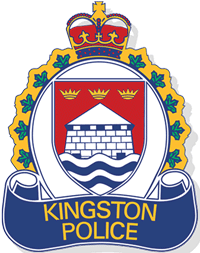
In January 2024, the Kingston Police recognized FINTRAC’s contribution to a fraud investigation that led to the arrest of an individual from Kingston, Ontario and the identification of seven victims who were defrauded over the course of four years. The accused in these cases allegedly accepted money from the complainants with the promise of a large sum in return. The individual was charged with 21 criminal offences, including fraud exceeding $5,000 and laundering the proceeds of crime.
FINTRAC demographics
Number of employees: 1 513
| Designated group representation | FINTRAC employees | Workforce availabilityFootnote2 | Federal public serviceFootnote3 |
|---|---|---|---|
Women |
55.2% |
58.4% |
56.6% |
Visible minorities |
21.1% |
20.2% |
21.7% |
Persons with disabilities |
6.8% |
8.5% |
6.9% |
Indigenous peoples |
0.8% |
2.5% |
5.3% |
| Official languages representation | FINTRAC employees | Canadian populationFootnote 4 | Federal public serviceFootnote 5 |
|---|---|---|---|
First official language – English |
64.7% |
75.5% |
71.1% |
First official language – French |
30.0% |
21.4% |
28.0% |
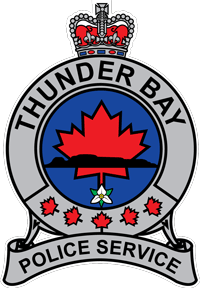
In February 2024, the Thunder Bay Police Service acknowledged FINTRAC’s contribution to a drug trafficking investigation that resulted in a significant seizure of cocaine, cash and property believed to have been obtained through proceeds of crime. Following the investigation, nine people were charged with more than 50 criminal offences, including possession of cocaine for the purpose of trafficking, trafficking cocaine, possession of property obtained by crime over $5,000, and possession of a loaded prohibited restricted firearm. Police also seized illicit substances with an estimated street value of about $2 million, including nearly 20 kilograms of cocaine; more than $1 million worth of property, including vehicles, luxury watches and jewelry; more than $100,000 in currency; and four handguns.
FINTRAC budget
FINTRAC’s resources are managed on the basis of effective policies and planning, reliable financial and non-financial information and sound analysis.
2021–22 |
2022–23 |
2023–24 |
|
|---|---|---|---|
Salaries |
$47.5 | $54.4 | $65.0 |
Employee benefit plans |
$6.7 | $7.6 | $9.2 |
Operations and maintenance |
$36.0 | $33.7 | $45.7 |
Total approved budget* |
$90.3 | $95.7 | $120.0 |
*Totals may not add due to rounding.
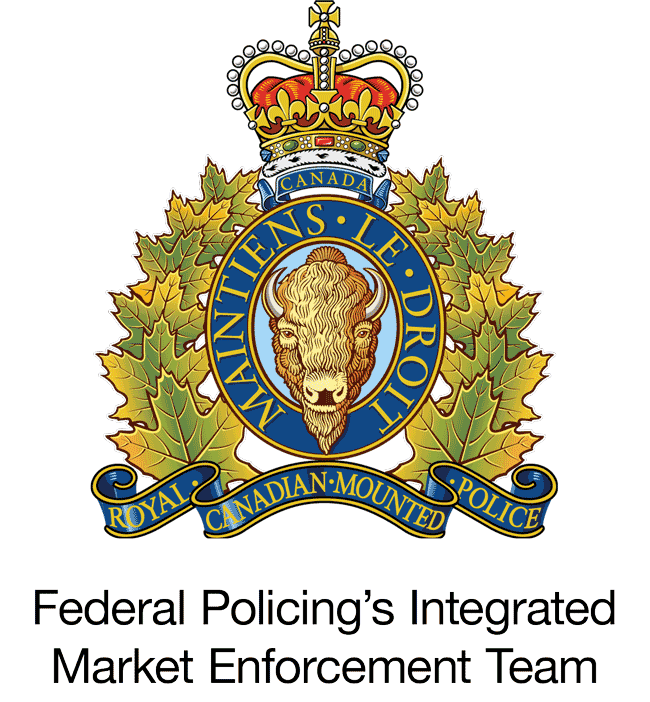
In April 2023, the RCMP Federal Policing's Integrated Market Enforcement Team recognized FINTRAC’s contribution to an investigation that led to charges of money laundering and theft against five people for their role in a sophisticated brand hijacking scheme. The investigation focused on allegations of fraud using an imposter website that imitated a legitimate investment firm. The website attracted numerous investors seeking high interest investment opportunities via online search engines. Investors were convinced to send their funds to various accounts at several institutions across Canada.
Annex A:
Project Protect – A sanitized case
Since its inception in 2016, Project Protect has helped target and disrupt a significant number of human trafficking related crimes throughout Canada. Inspired by Timea Nagy-Payne, a leading activist for victims and survivors of human trafficking, the project is focused on assisting businesses in recognizing and reporting financial transactions related to the laundering of proceeds associated with human trafficking for sexual exploitation. With the reporting that FINTRAC has received from businesses over the past eight years, the Centre has been able to generate nearly 2,000 disclosures of actionable financial intelligence for Canada's law enforcement agencies, helping to rescue countless victims of human trafficking and preventing new victims.
In 2023–24, Project Protect was expanded to include the laundering of proceeds associated with labour trafficking. This is aligned with the Updated Assessment of Inherent Risks of Money Laundering and Terrorist Financing in Canada, which identifies money laundering from human trafficking as a high-risk threat. Expanding the scope of Project Protect to include human trafficking for the purposes of forced labour also supports the Government of Canada's National Strategy to Combat Human Trafficking. Among the strategy's initiatives is a commitment to develop a new system to address the use of child and forced labour in Canadian supply chains.
What follows is a sanitized case related to human trafficking for the purpose of forced labour. This case includes information analyzed from suspicious transaction reports submitted to FINTRAC, as well as open source information. FINTRAC's analysis of these reports led to the production of actionable financial intelligence for Canadian law enforcement agencies that resulted in four individuals being charged. In accordance with the Proceeds of Crime (Money Laundering) and Terrorist Financing Act, tombstone information, dates and some facts have been sanitized.
Case Study
Background
This case was initiated when FINTRAC received information from police related to an ongoing labour trafficking investigation outside of a major metropolitan area. By following the money, police hoped that FINTRAC's financial intelligence could help them: (1) identify the criminal associates who were working together to facilitate the labour trafficking and determine who was ultimately benefitting from this operation; and (2) identify potential victims who were suspected to be exploited foreign nationals.
Police had spoken to the media about the ongoing investigation in an attempt to motivate victims to come forward in this case. They mentioned that the victims were being subcontracted to manufacturing facilities in multiple cities; however, the companies hiring these individuals were not aware that they were being exploited. Through online recruitment targeting foreign nationals, victims were promised a well-paying job in Canada, a work permit, a safe place to live, and ultimately a pathway to Canadian citizenship. However, upon arrival, their passports were taken from them, they were forced to work long hours for little to no pay, and they were forced to live in abhorrent conditions. Their traffickers discouraged them from going to police saying that they would be deported.
Analysis
By using the money laundering indicators found in FINTRAC's existing operational alerts, the Centre was able to identify red flags associated with human trafficking. For example, it was observed in the analysis of reports submitted to FINTRAC that suspected victims were listed as “unemployed” and held foreign passports from multiple countries as per bank records. The victims were also reported to be located at the same address (see Figure 1).
Figure 1 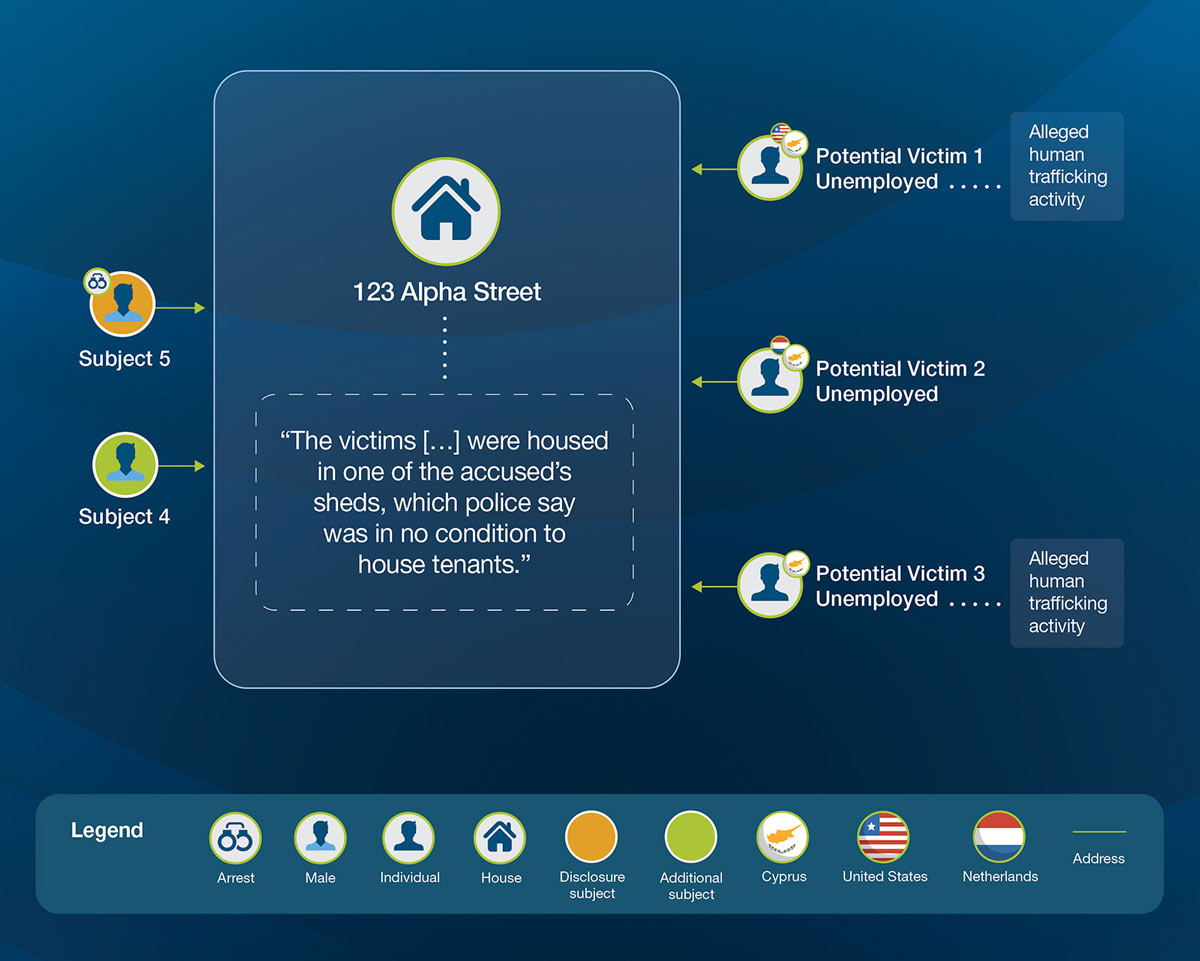
Over the course of five months, Subject 4's account received $15,000 from suspected victims through email money transfers. These transfers were from the proceeds of exploited individuals working at the manufacturing facilities. Subject 4 had a close relationship with the landlord of the location at which the victims were renting. Subject 4's associate was charging an exorbitant amount of rent compared to the victims' income.
Following the deposits, $14,000 was almost immediately moved out of Subject 4's bank account. The funds were either sent to individuals through email money transfers with no apparent connection to Subject 4 or were withdrawn in cash across three Canadian provinces. In addition, according to bank records, Subject 4 was listed as “unemployed”, which is inconsistent with the financial activity observed with individuals with no job. This overall transactional activity was consistent with trends in the financial activity linked to human trafficking.
Of the seven main individuals and entities included in the financial intelligence disclosure to police, FINTRAC's information was able to link six individuals and entities together through transactional activity (Figure 2). Furthermore, Entity 1 and Entity 2, owned by Subject 1, are businesses in industries that are common among work associated with foreign nationals (see Figure 2).
Figure 2
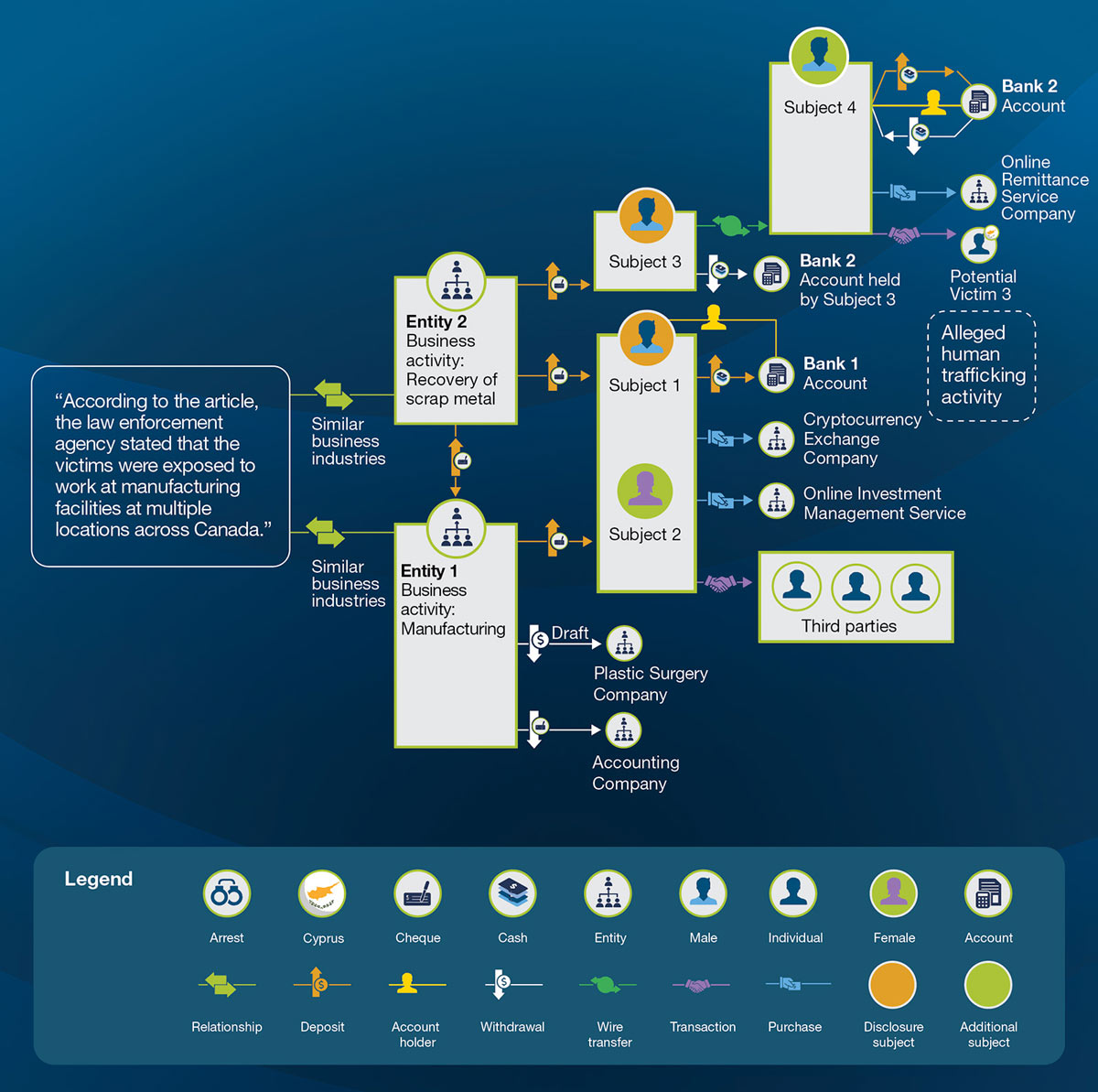
Results
FINTRAC's financial intelligence was used by police to corroborate their existing investigative material. In addition, the Centre's intelligence:
- Identified two additional individuals and two businesses that were not previously known to police;
- Confirmed an individual's ownership of two businesses;
- Established a marital relationship between two individuals;
- Demonstrated transactional activity connecting two individuals of interest;
- Identified new suspected victims and traffickers; and
- Provided additional information on existing victims, including their location and where their money was going.
Police used FINTRAC's financial intelligence to seek judicial authorizations to obtain banking information on the individuals included in the Centre's disclosure. Ultimately, the police investigation, which involved multiple provincial and municipal police forces, resulted in charges being laid against four individuals for trafficking in persons and material benefits in trafficking of persons.
As the investigation was ongoing, FINTRAC was able to support police in the search for victims and to help them get their lives back. The Centre's financial intelligence also played a role in convicting the traffickers committing these heinous crimes.
Resources
The Government of Canada has in place a number of resources to support victims and survivors of human trafficking. If you or someone you know may be a victim, you can call the Canadian Centre to End Human Trafficking's National Human Trafficking Hotline at 1-833-900-1010.
Annex B: Financial transaction reports
Large cash transaction reports
- 2023–24 : 6,203,220
- 2022–23 : 8,041,942
- 2021–22 : 7,220,383
A large cash transaction report is submitted to FINTRAC when a business receives $10,000 or more in cash in the course of a single transaction, or when it receives two or more cash amounts totalling $10,000 or more (each of which is less than $10,000) made within 24 consecutive hours by, or on behalf of, the same individual or entity.
Electronic funds transfer reports
- 2023–24 : 41,587,294
- 2022–23 : 27,315,564
- 2021–22 : 25,065,370
An electronic funds transfer report is submitted to FINTRAC upon the transmission of instructions for the transfer of $10,000 or more out of or into Canada in a single transaction, or in two or more transactions totalling $10,000 or more (each of which is less than $10,000) made within 24 consecutive hours, by or on behalf of the same individual or entity, through any electronic, magnetic or optical device, telephone instrument or computer.
Suspicious transaction reports
- 2023–24 : 631,137
- 2022–23 : 560,858
- 2021–22 : 585,853
A suspicious transaction report is submitted to FINTRAC in respect of a financial transaction that occurs or is attempted, and for which there are reasonable grounds to suspect that the transaction is related to the commission or attempted commission of a money laundering or terrorist activity financing offence. Unlike other reporting obligations, there is no monetary threshold associated with the reporting of a suspicious transaction.
Cross-border currency reports/cross-border seizure reports
- 2023–24 : 38,967
- 2022–23 : 23,699
- 2021–22 : 12,628
A cross-border currency report is filed with the Canada Border Services Agency by a person entering or leaving Canada carrying a sum of currency or monetary instruments of $10,000 or more, or by a person mailing or sending such large sums into or out of Canada. The CBSA then submits the report to FINTRAC. A cross-border seizure report is submitted to FINTRAC by a CBSA officer upon the seizure of cash or monetary instruments.
Casino disbursement reports
- 2023–24 : 292,350
- 2022–23 : 273,785
- 2021–22 : 153,195
A casino disbursement report is submitted to FINTRAC when a casino makes a disbursement of $10,000 or more in the course of a single transaction, or in the course of two or more transactions totalling $10,000 or more (each of which is less than $10,000) within 24 consecutive hours received by, or on behalf of, the same individual or entity. This report is not limited to cash disbursements.
Large virtual currency transaction reports
- 2023–24 : 86,405
- 2022–23 : 94,790
- 2021–22 : 60,361
A large virtual currency transaction report is submitted to FINTRAC when a business subject to the PCMLTFA receives virtual currency in an amount equivalent to $10,000 or more in a single transaction, or when a business receives two or more amounts of virtual currency that total $10,000 or more within a consecutive 24-hour window, and when the business knows the transactions were conducted by the same person or entity; were conducted on behalf of the same person or entity (third party); or are for the same beneficiary.

In August 2023, the Alberta Law Enforcement Response Teams recognized FINTRAC’s contribution to a human trafficking investigation that led to additional charges against an individual accused of targeting teen girls in the Calgary area and sexually exploiting them. After identifying a 15-year-old victim, police were able to identify three additional victims, between the ages of 16 and 18, leading to the additional charges, including sexual assault, sexual interference, material benefit from sexual services of a person under 18, making and distributing child pornography, and extortion by threats.

In December 2023, the Ottawa Police Service Drug Unit recognized FINTRAC’s contribution to Project Top Shelf, an investigation that led to the arrest of five individuals and seizure of approximately 40 kilograms of cocaine and four kilograms of crack cocaine, along with a large amount of bulk currency.

In December 2023, the RCMP Integrated National Security Enforcement Team for GTA/Southwest recognized FINTRAC’s contribution in an investigation that led to criminal charges against two people from Ontario who allegedly participated in the creation of Terrorgram Collective manifestos and Atomwaffen Division recruiting videos, in support of far-right extremism and the neo-Nazi terrorist movement. In 2021, Atomwaffen Division became a listed terrorist entity in Canada. The individuals were charged with, among other things, the commission of hate crimes offences for a terrorist group, participation in the activities of a terrorist group, facilitating terrorist activity and counselling the commission of a terrorism offence.

In February 2024, the Toronto Police Service recognized FINTRAC’s contribution to Project Blanco, an investigation into an alleged serial sex trafficker operating within the Greater Toronto and Greater Vancouver areas. Six female victims were allegedly sexually exploited for a commercial purpose from July 2018 onward. An individual from Toronto was charged with, among other things, six counts of procuring/exercising control, five counts of material benefit from sexual services, two counts of trafficking in persons, and laundering the proceeds of crime.
Financial Transactions and
Reports Analysis Centre of Canada
234 Laurier Avenue West
Ottawa, Ontario K1P 1H7 Canada
Telephone: 1-866-346-8722
© His Majesty the King in Right of Canada, 2024.
ISSN: 1910-9415
Cat. Nº: FD1E-PDF
- Date Modified:
